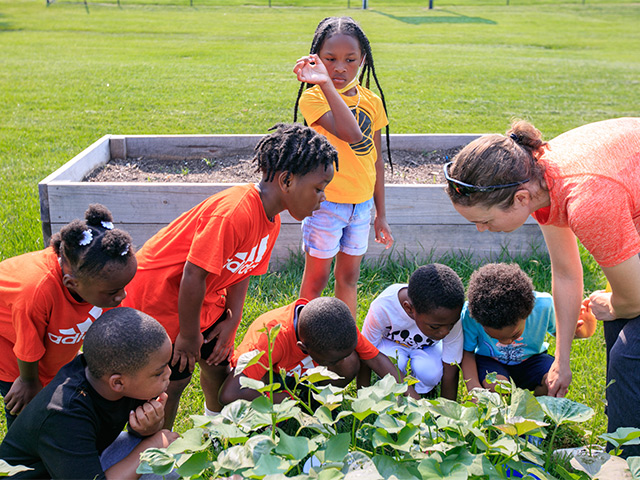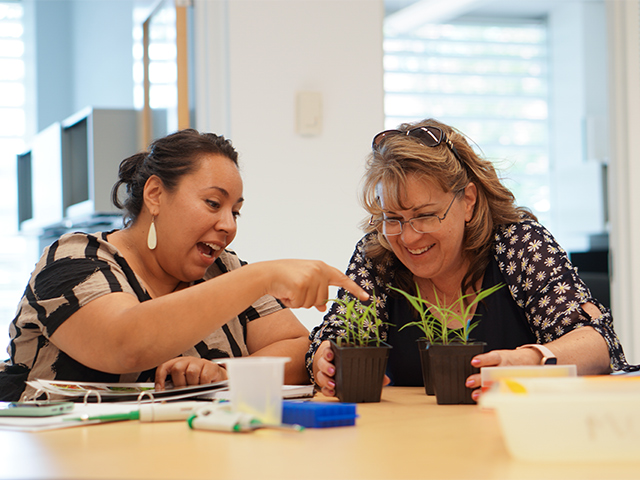Building Plant Scientist Identities, One Student at a Time
Science isn’t going anywhere. That’s the message that Kris Callis-Duehl, PhD, wants to share with the world. Callis-Duehl is the Sally and Derick Driemeyer Executive Director of Education here at the Danforth Center, and, in a recent talk, she spoke about building our future by giving young, passionate students the opportunity to engage in science.
“We have to eat,” Callis-Duehl said. “Ag is not going away. The science that supports it is not going away. Plant scientists are doing the work that feeds the community, and that is essential to everyone’s livelihood.”
“Our education programs are training the next generation of plant scientists to support the work of agriculture,” she continued. “This underlies the economic development of our state and of our country.”
Led by Callis-Duehl, our Education Research and Outreach Lab (EROL) is uncovering the best ways to spark students' interest in science—and turning that insight into real, hands-on experiences. In this blog, you’ll discover what their latest research reveals and how they’re putting it into action for students in our region.
What the Research Says: Reimagining Science Education
In collaboration with the Missouri Botanical Garden and Florida International University in Miami, EROL conducted a study to identify the essential skills for plant-related jobs in the United States. The study compared plant science skills in high demand with skills that students are taught in school. Their research showed significant discrepancies between what educators and students versus government and industry plant scientists ranked as the most important skills. The study also revealed that most plant science graduate students envision careers in academia, arboretums, or botanical gardens; awareness of other opportunities in the broader job market was low among both students and educators.
“This is unsurprising because those careers align most closely with what is familiar to students,” Callis-Duehl explained. “How could a student respond that they want a career they know nothing about? And how can we change that so that students have exposure to all their career options?”
Teaching The Three Cs
Through their research, EROL has identified a more effective alternative to the standard practice of teaching “The Three Rs”: Reading, Writing, and Arithmetic. They propose that students today should instead be immersed in “The Three Cs": Curiosity, Creativity, and Collaboration:
- Curiosity fuels lifelong learning. It encourages students to ask questions, explore the unknown, and pursue knowledge beyond the classroom.
- Creativity enables innovation, problem-solving, and the ability to adapt in a world of rapidly changing technologies.
- Collaboration—working across disciplines, integrating a variety of perspectives, and thriving in team environments—is essential both in science and in the broader workforce.
Callis-Duehl made the point that these are skills humans are born with, but they are not always encouraged in the classroom. Often, students are instead trained to absorb right-or-wrong answers that can be measured by a test; to go by the book rather than think outside the box; and to focus on individualized success.
EROL’s research points to the need to reverse that trend by fostering, not stifling, the innate curiosity, creativity, and collaborative skills that students bring with them. She noted that while emerging technologies like AI may automate many tasks, they cannot replace those capabilities.
“If we can use the three C’s as a foundation for how we train students, they will be ready for any career of the future,” Callis-Duehl explained. “In particular, The Three Cs are three of the most essential things in science.”
Developing a Scientist Identity
When it comes to preparing students specifically for careers in science, the first crucial step is to help them develop a scientist identity. If students can see themselves as scientists—if they can imagine a future in which they belong in scientific spaces—they are far more likely to persevere through challenges and stay on the path toward science careers.

EROL helps students imagine a career in science by bringing authentic, hands-on plant science experiences to students from a young age.
One way to encourage this is by bringing hands-on plant science education to students from a young age. EROL works to provide experiences that build this scientist identity for over 3,000 students across 50 academic institutions in our region. Students from kindergarten to graduate school engage in EROL’s Authentic Research Experiences (AREs) and Course-based Undergraduate Research Experiences (CUREs). These programs offer the chance to engage in real scientific discovery. Students don’t just walk away with a brain full of facts; they complete the programs having learned how to think and work like scientists.
One example of this approach comes from EROL’s collaboration with the Eveland Lab at the Danforth Center. Undergraduate students study two-week-old corn plants to examine how their genetic makeup (genotype) influences physical traits like leaf angles (phenotype). Using imaging technology, they collect data on different corn varieties, contributing to the Eveland Lab’s broader research on how genotype affects phenotype. The lab, which studies adult corn plants, uses the students’ data to build a more complete model of corn development from seedling to maturity. Afterward, students report not only learning new techniques and concepts but also experiencing the excitement of helping uncover something previously unknown.
Survey data shows that students who participate in AREs and CUREs consistently report helping their peers with data collection and analysis, conducting original investigations, and revising their own work to improve it—key elements of real scientific practice. Most importantly, students surveyed before and after participation show significant increases in both their interest in science careers and their ability to see themselves as scientists. This shift, building a scientist identity, is one of EROL’s core goals.
Shaping the Future Together
For those who are interested in aiding EROL in their mission, Callis-Duehl had a few suggestions: She encouraged educators to collaborate with professionals outside academia when developing curriculum and to bring non-academic speakers to classrooms and seminars to help expose students to a variety of career options. She asked scientists to get involved by volunteering to help with AREs and CUREs and by including the possibility of adding research interests to existing AREs and CUREs when writing grants.

EROL offers continued education workshops for science educators.
Across the board, she emphasizes the importance of professionals in all industries to continue to cultivate their own Three Cs by volunteering, participating in workshops, working across sectors, speaking up in support of education and science, and continuing to learn. The more people engage with plant science, the more we empower a healthier, more sustainable future—one where everyone has a role in shaping our food, medicine, and fuel.